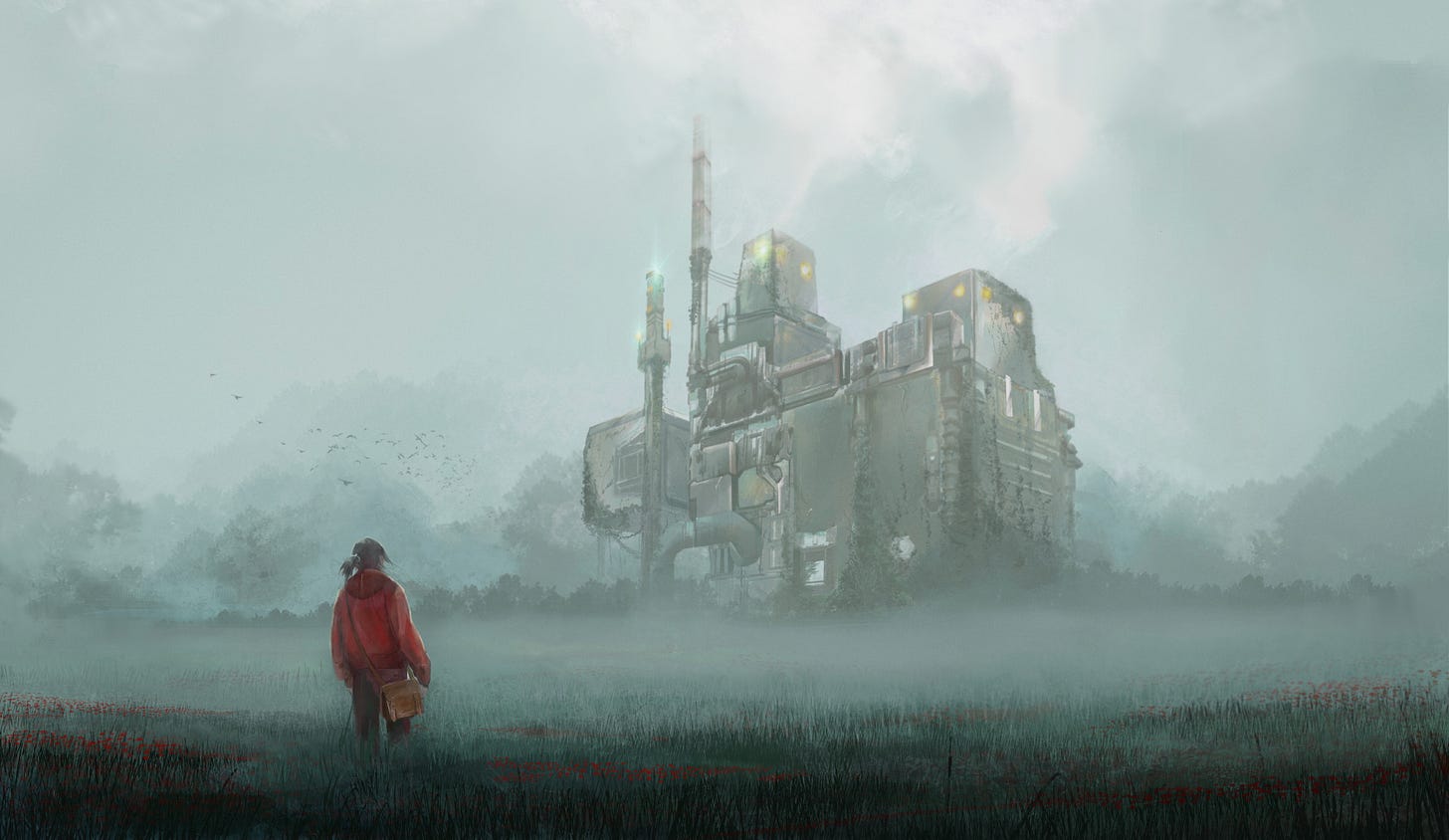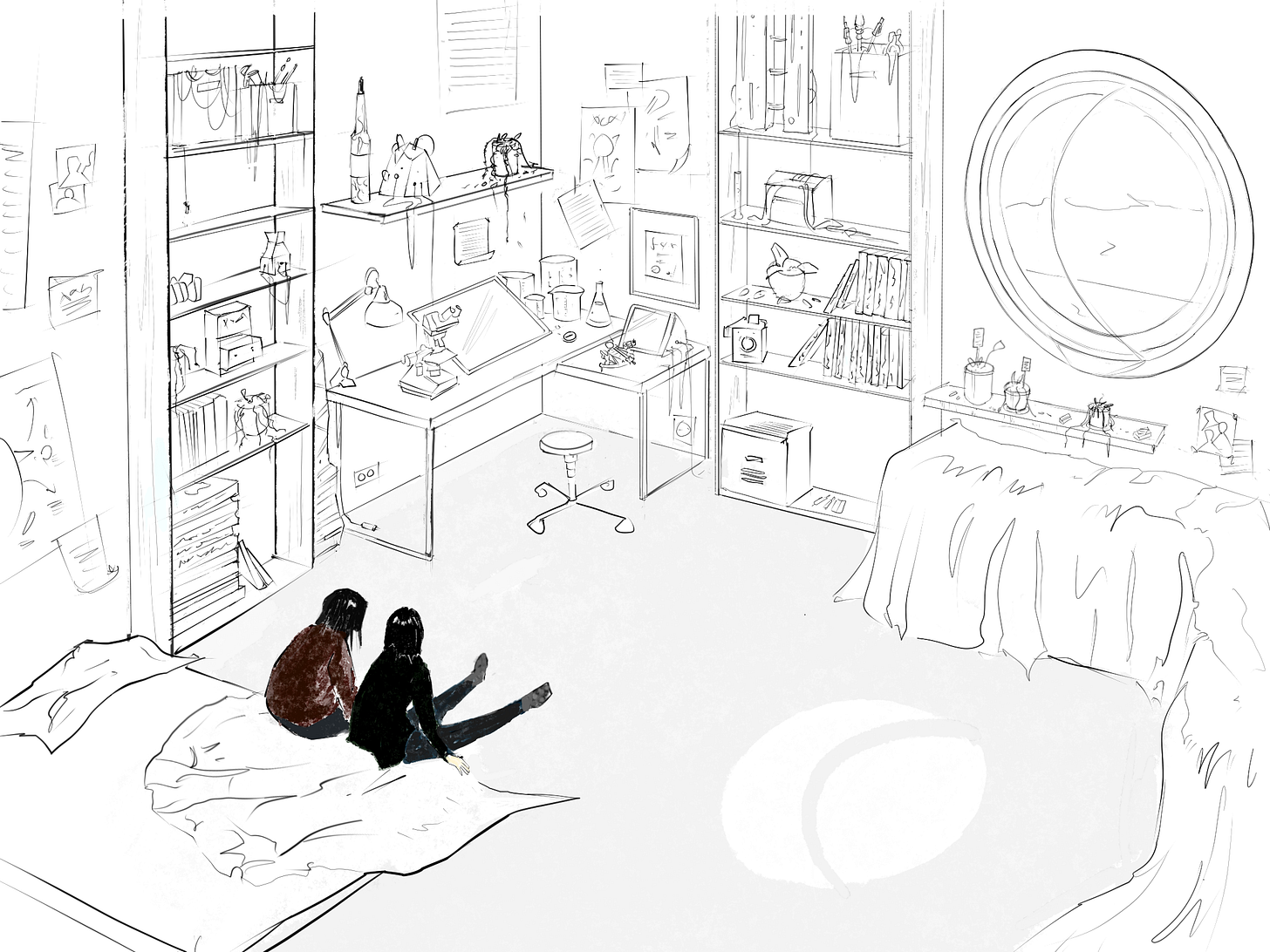The healer said it was radiation poisoning, but Haojing knew only that her mother was dying. When she regained her senses, she had approached her mother’s body in terror, sure that Chien-yi was already dead, but found her alive and conscious. It was only after Haojing had helped her to her feet that the extent of her mother’s injuries became plain. She wheezed with each breath, and leaned into Haojing so heavily that they were forced to frequently stop on their walk back to the house. Mac had offered to help, but he was clutching his shattered arm and limping besides, and Haojing had shaken her head no. Now she sat at the foot of the cot, her mother lying in front of her, breathing heavily in her sleep. The healer had come and gone a few hours before, and so Haojing was left to sit and think about what she had said: it was only a matter of time.
She looked about her father’s old workshop. Under different circumstances, this opportunity to explore the forbidden room would have thrilled her. When they had reached the house, Haojing had expected to take Chien-yi to her own bed, but she had insisted on having the cot dragged up to the workshop. It was exactly as she had imagined it, exactly as it had looked through the few stolen glances she had gotten as a child, a chaos of circuit boards and wires and old computers and junk, various projects gathering dust in corners. There on a table sat her father’s sextant and compass, which he had taken with him on his many trips exploring, which took hours or days and happened without warning. There were batteries, scattered around, and she idly wondered if they had any juice. Old dead plants, dried out and yellowed, sat in pots against the window. She could not help feeling cheated that this was how she got to see this room, after all these years.
Besides her, Chien-yi stirred.
“Sit me up, little mouse,” she said. Haojing leaned over and helped. They sat together quietly for a while.
“How is Long Fei?” Chien-yi finally said.
“He’s alright. He’s taking apart the drone, seeing what he can salvage.” She had told Long Fei what the healer had said about their mother’s condition, and no one else, not even Mac, who was himself convalescing in another room. Long Fei had said nothing, just disconnected from his hub and stamped off to collect what was left of the drone. It frightened her to see him disconnected, but she knew better than to say anything. She just stood at the door and watched him shuffle off.
Chien-yi was frowning.
“You should get rid of it. All of it,” she said, rasping. Her breathing had gotten worse even in the few hours since the healer had left.
“They’re going to come back. Aren’t they, mother?”
Chien-yi stared off into the distance.
“Yes.”
“Mother, what was that thing? What is the Sanhedrin? What is happening?”
Chien-yi sighed and turned to face Haojing. She leaned over and picked up a flask of water on the side table, wincing in pain as she drew it to her lips.
“I don’t know quite when they started calling themselves the Sanhedrin. When I first met the men responsible, they were just a bunch of scientists and engineers. They were barely political. Now….” She trailed off, clutching her water. “You have to understand. When things began to come apart, there were all manner of groups coming together, saying that they were going to save the world. And you know they almost all had good intentions. They really did. There were some wannabe warlords and gangs, a general or two out to establish himself as the leaders of a new order, but mostly it was an army of do-gooders. They were all going to fix things. They were good men.”
“What happened?”
She chuckled. “What happened? They formed committees. They talked and talked. They did what do-gooders do.”
She blew a fast breath out of her mouth, a sure sign she was feeling irritable.
“Then groups broke apart into splinter groups. They disagreed on procedure; they disagreed on policy. They’d commission research while their buildings were on fire. And people kept dying. Their cities sank, or they got the creeping fever. But most of all the scientists and politicians and engineers couldn’t bear a world where the same old deals didn’t apply. They just never wanted to accept that the rules didn’t work anymore. You’d talk to them and what was happening was so obvious, but they’d always be so confused. The problem with that class of person, they fundamentally could not believe that the system could really crash. And it crashed, and they were bereft. Eventually they stopped asking me to sit on committees.”
“But the Sanhedrin.”
“Yes, the Sanhedrin. Like I said, they were academics, researchers. Only when things collapsed and most of the committee types gave in, they got militant. Religious, actually, was the complaint, which is where the name comes from. It started out as a joke. It’s funny, I don’t think more than a handful of them were Jewish. But somebody made that comparison, and it just stuck.” She grasped the flask tightly with shaking hands, then placed it back down again.
“Everyone was looking for that, those days, for old wise men to lead us out of the wilderness. Anyway. I don’t think it’s a joke anymore.”
“What do they want? Are they just tech thieves?”
“No, they’re far too self-impressed for that. They see themselves as stewards. Stewards of technology. Or at least they did. That’s their idea, though – they came to keep us safe, to save us from ourselves. They aren’t just taking it to have it. They’re taking it to keep it away from us.”
“Why?”
“Because the world failed, and it failed because of people and because of technology, and they were all men who could not comprehend that technology could be to blame. And so they concluded that the problem in the equation was the human beings and not the machines.”
“How do you know so much about them?”
“I knew many of them, or at least many of the ones who started the group, in a different life. I have no idea how many of them are left. But I knew them then. They were idealists then, and so was I, I suppose.”
She paused.
“And so was your father.”
“Is that where my father went? Did he go to them, when he left?” She felt filled with fear as she asked, without really knowing why.
“No. When your father left, I don’t think he had any particular destination in mind. But I am certain he did not end up with the Sanhedrin,” she said, arching an eyebrow. “The Sanhedrin are an organization, and your father never was much for being organized.”
Her throat constricting in emotion, Haojing asked the question she had never dared to ask.
“Is my father dead?”
“I don’t know. I’m sorry. But I truly don’t know.”
Haojing swallowed hard, studying the floor in front of her. For a long while they did not speak.
“The drone…. I’ve never seen anything like it,” said Haojing, finally.
“It is impressive. Even for them.”
“Do they have – do they have a lot of technology like that?”
“I have no idea. They were always scavengers, hunters for tech. But that level of aggression….” She shook her head. “I never thought they would come this far east.”
“That device you used…. The cylinder.”
“An EMP. A tech-killer. Your father’s design, although I was the one who taught him how they work. But he was gifted, you know. He would have fit in quite well, these days, if he hadn’t fit in so poorly.” She spoke quietly. “When I found the EMP…. That was our last fight, the worst one. He left the next day and never came back.”
“Because of Long Fei.”
Chien-yi nodded.
“Yes. I was outraged. I could not believe he could build such a thing, just upstairs from where my child slept.”
“That was why you had to run away from the house last night.”
“Yes.”
Haojing sat and thought for a while, trying to process everything. Chien-yi coughed and spasmed beside her.
“Mother, I…. Couldn’t he have just gotten rid of it? He was forever building things.”
“He had become obsessed with that kind of device. It consumed him. I don’t know. He was not well.”
She stared over at a piece of furniture, perhaps a couch, covered by a blanket in the corner.
“What is it?”
“Perhaps you had better go and pull that blanket off of there,” she said, shaking her head. Curious and concerned, Haojing walked over and pulled off the sheet. It was not a couch.
Perched on a crudely-made wooden frame sat a thick metal cylinder, as long and tall as an office desk. Its body was made of some sort of thick pipe. Cables of coiled wire snaked around its frame. Two car batteries were bolted to its end, and filaments emerged from its wires. Jammed inside its cap, Haojing could make out some old circuit boards. It took her a moment to realize that she was staring at a giant version of the EMP her mother had used to disable the drone. Stunned, she stepped back and sat on the foot of her mother’s cot.
“It – the range, how long – ”
“Thousands of square kilometers. Thousands.”
“But… if you were worried for Long Fei, why did you keep it? Why not destroy it, scatter its parts?”
“Call it leverage. I always thought it could prove a useful bargaining chip.”
She was overcome by a coughing fit, hacking and shaking. Haojing handed her water again, but she would not drink. So she simply sat on the bed, holding her mother until the spasms had passed. She began to cry.
“Mother, what am I going to do?”
“You are going to get my sister, and she is going to move her own children here, and she is going to help look after Long Fei and the boys. She owes me that much. She owes me more.”
“But Long Fei…. What do we do when they come back? We can’t stay, and he can’t leave.”
“No. No, it’s true. In the long run they will be back. You cannot stay here.”
She reached out and held Haojing’s hand.
“You have to go to Big Flat. You have to ask it for its advice. Ask it how to fix Long Fei’s firmware. Ask it for help.”
Haojing gasped, audibly, searching her mother’s face.
“Go… to Big Flat? Mother….”
“I know. I’m sorry. But I can think of nothing else. Go to Big Flat. Tell it who you are. Listen to what it says. Then come back home and save your brother.”
Haojing realized that she had still been crying. She felt embarrassed, to cry in front of her mother, which she had not done since she was a little girl. She wiped away her tears and tried to ignore the feeling of cold terror that was growing inside of her.
“Yes, Mother. I’ll go to Big Flat.”
After that, they said nothing, but Haojing sat for a long while anyway, listening to her mother breathe.
Table of Contents and instructions for subscribing to just this serialized novel here. Illustrations by Vika S. If you enjoy this novel, consider leaving a tip. Tips will be split equally between the author and illustrator. Sign up for fredrikdeboer.substack.com here.
©2019 Fredrik deBoer



